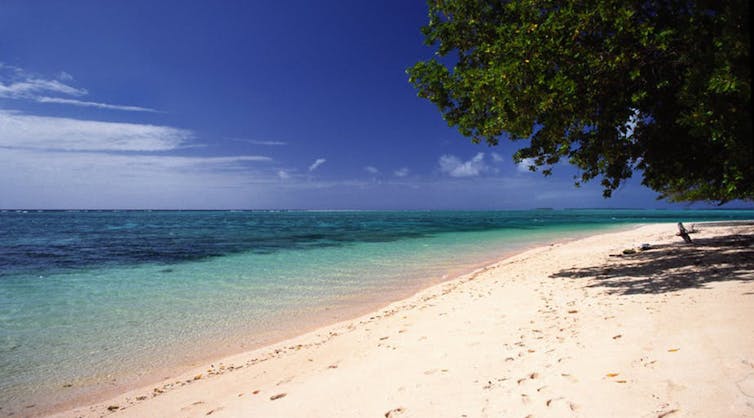

The last thing the Marshall Islands need is a cryptocurrency
Source : David Glance / The Conversation

The Marshall Islands, Laura Beach.
Stefan Lins/Flickr, CC BY
David Glance, University of Western Australia
The Micronesian Republic of the Marshall Islands is set to become the first country to base their national currency on a cryptocurrency. The Israeli company Neema will provide the technology and support to launch an initial coin offering (ICO) that is expected to raise $30 million, half of which Neema will keep.
The Marshall Islands’ parliament passed the law that will create the cryptocurrency, known as the sovereign (SOV) earlier this month, giving it full legal status as a currency to be used alongside the US dollar. Unlike bitcoin, all 24 million of the sovereign coins will be issued at once with 6 million being sold to foreign investors and 2.4 million going to Marshallese residents. The money raised will pay for the system in addition to funding anti-global-warming projects and supporting citizens that are still affected by the nuclear bombs the US army tested in the area between 1946-1958.
Dodgy or politically motivated ICOs
The news of the Marshall Islands’ ICO comes at a time of growing concern about ICOs being thinly disguised scams. Google announced in March that it would be banning all advertising promoting cryptocurrencies and initial coin offerings, a move that follows a similar move in January by Facebook. European and US authorities have also warned of the risks of investing in ICOs. ICOs are banned in China and South Korea.
Perhaps the most contentious of recent ICOs has been that of the Venezuelan government’s “petro” cryptocurrency that President Nicholas Maduro claimed has raised US $5 billion. If true, this would have represented a significant victory for the country in bypassing US sanctions that are currently in place. However, until the currency begins trading on exchanges, it will be impossible to verify if the claims made by the Venezuelan government are true. Right now, the ICO is being used mostly for propaganda
In the case of the Marshall Islands, it is absolutely not clear what purpose a digital currency would serve. The country suffers high unemployment and incidences of chronic diseases and most of its national income comes from foreign aid. Slow speed Internet access is available but out of the financial reach of most residents of the islands. Only 19% of the population use the Internet and 30% have a mobile phone with the mobile phone network still being predominantly 2G
It is hard to see what would maintain the value of the sovereign once it is issued, a problem faced by most of the new cryptocurrencies. In addition, even though the sovereign is technically a cryptocurrency, the fact that it is controlled by a central government, that all of the coins are issued at one time, and that it requires all parties to a transaction to be identified, is completely contrary to the original idea of bitcoin. The use of identification, possibly by facial recognition, is part of a “Yokwe” permissioning protocol that has been added to the cryptocurrency to make it non-anonymous.
Cryptocurrencies and climate change
The biggest irony of the Marshall Islands’ launching a cryptocurrency is the country faces annihilation from global warming, yet the technology on which cryptocurrencies are based consumes massive amounts of electricity and thus contributes to large amounts of CO2 emissions – driving the very sea rise that threatens the Marshall Islands. Bitcoin has been estimated to use 42 TWh of electricity per year, which is more than New Zealand’s annual consumption and would be responsible for 20 megatonnes of CO2 emissions. Bitcoin and Ethereum combined use only slightly less energy every year than Venezuela.
The reason that cryptocurrencies use this amount of energy is all to do with the way transactions are recorded on the blockchain. To prevent fraud and verify that currency has been sent between one party and another, a great deal of intensive computer work is done which uses a large amount of electricity. Even though Ethereum uses less energy than Bitcoin, its use is still significant as is the associated CO2 emissions that result.
The debate in the Marshall Islands’ parliament about the adoption of the cryptocurrency focussed on the financial costs and benefits of that money to the country. The government even plans to allocate 10% of the proceeds from the ICO to a Green Climate Fund.
![]() Possibly the best scenario for the ICO is for it to succeed and provide the Marshall Islands with much needed funds but for the cryptocurrency itself never to be used so that it doesn’t hasten the nations disappearance under the sea.
Possibly the best scenario for the ICO is for it to succeed and provide the Marshall Islands with much needed funds but for the cryptocurrency itself never to be used so that it doesn’t hasten the nations disappearance under the sea.
David Glance, Director of UWA Centre for Software Practice, University of Western Australia
La version originale de cet article a été publiée sur The Conversation.






 Actualités
Actualités













